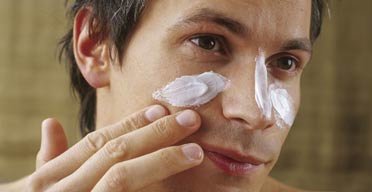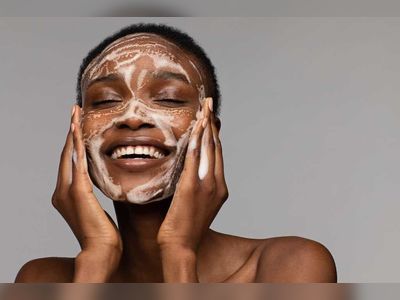British men in their fifties and sixties are spending £306m a year on lotions, potions and serums that claim to fight the effects of age, a fourfold growth since 2002. And the market is predicted to double again by 2010, says a new study by Mintel, the research organisation.
'In the past seven years there has been an 800 per cent growth in the sales of male toiletries, but the market is still 15 years behind the female market, so the potential for further growth is absolutely huge,' said Noella Gabriel, director of product and treatment development at the Elemis spa and skincare brand.
'Men are a hard market, but once you've got them through the door once, they are very loyal. Far more so than women, in fact. We're all of us cosmetic companies fighting for men's custom at the moment. The company that succeeds will be very happy indeed.'
Men over 45 are the toughest target for cosmetic companies. Yet over the past few years, little pots of unguents have started appearing in their bathroom cabinets where before only shaving cream and the odd half-empty bottle of Old Spice lurked.
Alan Booth, a 45-year-old nanny, spends £120 a month on skin care products, up from £80 a couple of years ago. 'In the past it was embarrassing because products looked so feminine,' he said. 'Now it's much better; the packaging is masculine and the choice of products is increasingly sophisticated.'
Last year 53 new anti-ageing skin care products for older men were launched, according to Datamonitor's Productscan Online, four times the number of new products that appeared in 2005.
A decade ago, Mintel found, few heterosexual men over 40 would dare to admit that they used moisturiser. Then the market exploded, with men able to shop for products marketed specifically to appeal to them, whatever their age, from ranges at the Body Shop, used by Jon Snow, to Terracotta Pour Homme, a bronzer made by Guerlain and reportedly favoured by Bill Clinton.
Whether there are enough differences between older and younger men's skin to justify separate product ranges is, said Dr Nick Lowe, consultant dermatologist at the Cranley Clinic in central London, a moot point. 'The requirements of men's skin are not that different to, say, those of two women from different ethnic backgrounds, or of different ages, or with differing degrees of sun exposure,' said Lowe, who produces his own, unisex skin care range.
However, with the women's market saturated and the younger male market increasingly developed, it is the older male market that remains fertile. 'The stakes are rising when it comes to tapping the older male market,' said a spokesman for Boots, which launched its No 7 for Men last year.
'According to our research, nine out of 10 men of all ages think cosmetics and clothes give them more pulling power than a car. They spend on average three hours a week preening themselves and seven out of 10 admitting to using concealer.'
A third of men aged 18 to 59 questioned in a recent poll in Men's Health magazine backed up the findings, saying it was 'very or extremely acceptable' to use anti-ageing products. 'Guys definitely want to look younger and they're interested in having the tools to do so,' said Brian Boye, fashion and grooming editor for the magazine.
Mintel's report on anti-ageing products agreed. 'Men in general have shown that they are much more open to using products that enhance personal appearance, including anti-ageing products,' it said. 'The drive to look youthful has overtaken the desire to look distinguished. Almost half the men we spoke to said they feared ageing and feared being perceived by colleagues as getting older.'
Dr Martin Tovee, a reader in visual cognition at Newcastle University's school of psychology, believes the industry's determination to ensnare men has come at a perfect time. 'Traditionally, it benefited men to look like they had experience of life because, when it came to securing partners, they traded their resources and status - virtues accrued when men reach their mid-40s - for a woman's fertility and beauty, which tend to peak in their twenties,' he said.
'Now women have their own resources and status, men are having to attract partners in different ways which are turning out to be more superficial. Suddenly men's skin-deep beauty has become their unique selling point. And if men use their youthful beauty to sell themselves to women, it makes perfect sense that the cosmetic companies will charge top dollar to sell it to them.'











